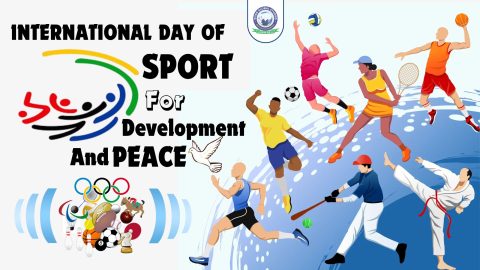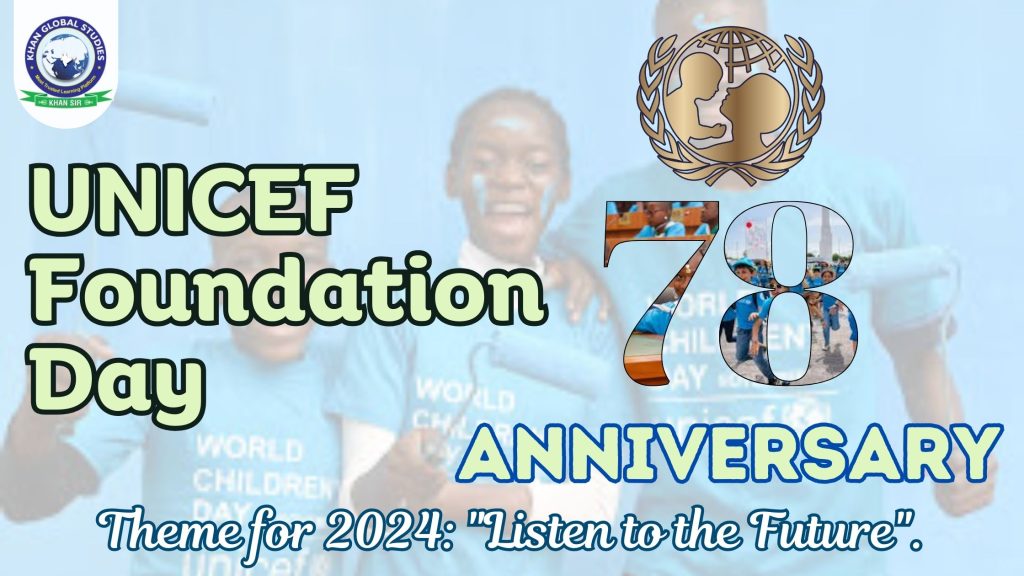UNICEF (United Nations Children’s Fund) Foundation Day is celebrated every year on December 11. This day provides an opportunity to promote children’s rights and acknowledge the global efforts made for their welfare.
It marks the 78th anniversary of UNICEF, a global organization that has been playing a leading role in safeguarding children’s rights and welfare.
Over the past decades, UNICEF has made unique contributions in reducing child mortality rates, improving education levels, and supporting underprivileged communities.
UNICEF Foundation Day 2024: Key Information
| Topic | Details |
| Organization | United Nations Children’s Fund (UNICEF) |
| Original Name | United Nations International Children’s Emergency Fund |
| Anniversary | 78th Anniversary |
| Headquarters | New York City, USA |
| Tagline | For Every Child |
| Key Activities | Child health, support for education, immunization, and child protection |
| Major Campaigns | Fair Start, Champions for Children, Early Moments Matter |
History of the Organization’s Formation
In 1943, Polish health expert Ludwik Rajchman suggested in an article published in “Free World” that a future international organization should include a healthcare service.
On December 11, 1946, UNICEF was established under United Nations General Assembly Resolution 57(I). Initially known as the United Nations International Children’s Emergency Fund, its first chairman was Maurice Pate.
In its early days, the organization functioned as a temporary relief agency providing food and clothing to children and mothers affected by war. However, in 1953, it became a permanent organization, with its scope expanded to encompass the overall well-being of children.
Formation and Development of UNICEF
UNICEF was established on December 11, 1946, by the United Nations Relief and Rehabilitation Administration to provide immediate relief to children and mothers affected by World War II. Later that year, the United Nations General Assembly formally established it to continue post-war relief efforts. Over time, UNICEF evolved into a global organization working in more than 190 countries and territories.
In 1950, UNICEF’s objectives expanded to address the long-term needs of children and women in developing countries. By 1953, it became a permanent part of the United Nations system, and its name was changed to the United Nations Children’s Fund, though the abbreviation “UNICEF” was retained.
UNICEF: A Dedicated Global Organization for Children
UNICEF, originally known as the United Nations International Children’s Emergency Fund, was renamed the United Nations Children’s Fund in 1953. However, its popular name, “UNICEF,” remains widely used. It is one of the leading organizations under the United Nations.
UNICEF is active in 192 countries and territories and is regarded as one of the most prominent and influential organizations in the field of social welfare. Its areas of work include vaccinating children and preventing diseases, treating children and mothers affected by HIV, improving nutrition, promoting hygiene and sanitation, advancing education, and providing emergency relief during disasters.
Full Form of UNICEF
UNICEF was established on December 11, 1946, by the United Nations General Assembly. Initially, it was created as a temporary agency to provide food, clothing, and healthcare services to children affected by World War II in Europe.
In 1953, it became a permanent part of the United Nations system and was renamed the United Nations Children’s Fund, though the abbreviation “UNICEF” continues to be widely recognized. In 1965, UNICEF was awarded the Nobel Peace Prize for its efforts in assisting children worldwide.
UNICEF’s Key Work and Achievements
UNICEF has undertaken several commendable initiatives over the past few decades to improve children’s quality of life.
- UNICEF’s Areas of Work
- Reduction in Child Mortality: Saved over 760 million children through vaccination and health programs.
- Promotion of Education: Campaigns like “Education Cannot Wait” ensured education for children in conflict zones.
- Gender Equality: Empowered communities by focusing on girls’ education and health.
- Emergency Aid: Provided critical assistance during the COVID-19 pandemic, natural disasters, conflicts, and crises like the Syrian conflict.
- Polio Eradication Campaigns: Played a crucial role in eliminating deadly diseases such as polio.
- Vaccination Programs: Saved millions of lives globally through vaccination initiatives.
- Efforts for Education: Worked toward providing quality education, especially for girls, worldwide.
- Support for Education: Constructed schools, provided teaching materials, and promoted gender equality in education.
- Water and Sanitation: Ensured access to clean drinking water and sanitation services.
- UNICEF’s Achievements
- Assisted in the birth of 27 million children in 2018.
- Delivered pentavalent vaccines to 65.5 million children.
- Arranged education for 12 million children.
- Treated 4 million children for severe malnutrition.
- Addressed 285 humanitarian emergencies in 90 countries.
- Recognitions and Awards
UNICEF has received numerous accolades for its contributions, including:
- The Nobel Peace Prize in 1965.
- The Indira Gandhi Prize in 1989.
- The Princess of Asturias Award in 2006.
- Operational Structure
- UNICEF operates through 150 country offices, its headquarters, and 34 national committees. Seven regional offices provide technical support, while the Supply Division in Copenhagen and New York delivers critical supplies and services worth over $3 billion.
UNICEF’s Work and Contributions
Key Areas of Work
| Primary Focus | Initiatives |
| Healthcare Services | Vaccination against diseases such as polio and measles. |
| Education | Building schools, providing educational materials, and promoting gender equality. |
| Nutrition Programs | Addressing malnutrition through supplements and nutrition education. |
| Water and Sanitation | Ensuring access to clean drinking water and sanitation facilities. |
| Emergency Assistance | Providing essential supplies during crises, conflicts, and pandemics. |
| Policy Advocacy | Raising awareness about children’s rights and driving policy changes. |
- Core Contributions
- Child Health: Ensuring better health outcomes for children.
- Support for Education: Enhancing access to education and resources.
- Vaccination Efforts: Preventing diseases through widespread immunization campaigns.
- Child Protection: Safeguarding children’s rights and well-being.
- Major Campaigns
- Fair Start
- Champions for Children
- Early Moments Matter
UNICEF: Funding and Operations
UNICEF relies entirely on voluntary contributions from governments and private donors. In 2023, UNICEF’s total income amounted to $8.37 billion, with $5.45 billion provided by public sector partners. The organization’s operations are overseen by a 36-member Executive Board, which formulates policies, approves programs, and monitors administrative and financial plans. This board comprises government representatives elected by the Economic and Social Council, typically serving three-year terms.
Importance of UNICEF Founding Day 2024
UNICEF Founding Day is celebrated annually on December 11. The 78th anniversary in 2024 offers an opportunity to honor UNICEF’s significant achievements and reinforce ongoing efforts to safeguard children’s rights and welfare. This day serves as a reminder of the remarkable progress made and the essential work still required to protect children, whether in times of crisis or normalcy. It underscores UNICEF’s unwavering commitment to supporting vulnerable children worldwide.
2024 Theme
The theme for World Children’s Day 2024 is “Listen to the Future.” This year, we’re inspiring the world to genuinely hear and value children’s hopes, dreams, and aspirations for the future, emphasizing their right to meaningful participation. It’s essential to empower children to express their vision for the world they wish to create. Our collective responsibility is not only to listen but also to support and nurture their ideas, helping turn their aspirations into reality.
UNICEF’s Mission
- The primary objectives of UNICEF are:
- To protect the rights of children.
- To provide essential services like health, education, and sanitation.
- To offer assistance to children and their families in emergency situations.
Activities on UNICEF Founding Day
- On this day, various programs and campaigns are organized, including:
- Awareness campaigns to promote children’s rights and their protection.
- Workshops and seminars.
- Charity events and fundraising programs.
- Media campaigns to showcase UNICEF’s global achievements.
FAQs
Q1: Where is UNICEF headquarters?
Answer: UNICEF’s headquarters is located in New York, USA.
Q2: What issues does UNICEF address?
Answer: UNICEF works on issues related to child health, nutrition, education, sanitation, and emergency relief.
Q3: How is UNICEF funded?
Answer: UNICEF is primarily funded through government contributions, donations, and partnerships.
Q4: Does UNICEF work exclusively for children?
Answer: While UNICEF primarily focuses on children, its work also impacts their families and communities.
Q5: How can one get involved with UNICEF?
Answer: To get involved with UNICEF, you can visit their official website to donate, volunteer, or participate in their campaigns.
UNICEF Founding Day serves as a reminder that every child’s rights matter, and it is our collective responsibility to work tirelessly for their welfare. On this day, we must pledge to unite and continue working for the well-being of children everywhere.





